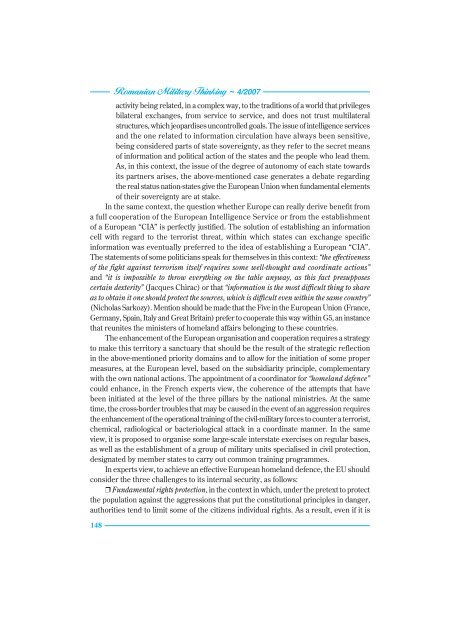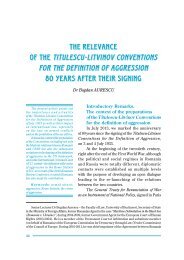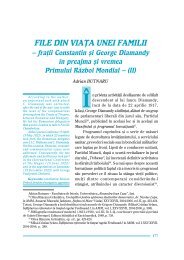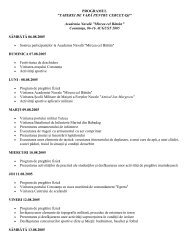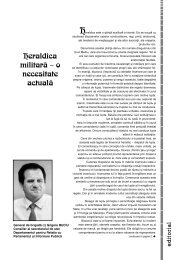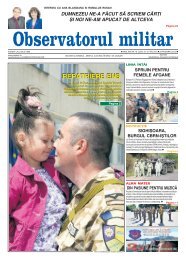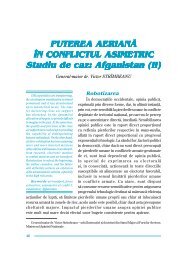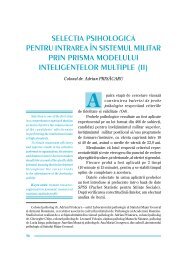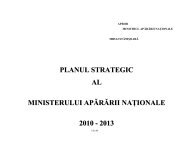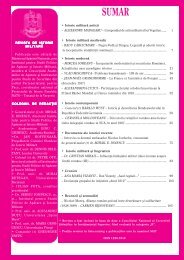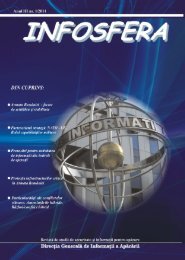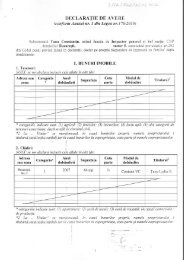Romanian Military Thinking
Romanian Military Thinking
Romanian Military Thinking
Create successful ePaper yourself
Turn your PDF publications into a flip-book with our unique Google optimized e-Paper software.
148<br />
<strong>Romanian</strong> <strong>Military</strong> <strong>Thinking</strong> ~ 4/2007<br />
activity being related, in a complex way, to the traditions of a world that privileges<br />
bilateral exchanges, from service to service, and does not trust multilateral<br />
structures, which jeopardises uncontrolled goals. The issue of intelligence services<br />
and the one related to information circulation have always been sensitive,<br />
being considered parts of state sovereignty, as they refer to the secret means<br />
of information and political action of the states and the people who lead them.<br />
As, in this context, the issue of the degree of autonomy of each state towards<br />
its partners arises, the above-mentioned case generates a debate regarding<br />
the real status nation-states give the European Union when fundamental elements<br />
of their sovereignty are at stake.<br />
In the same context, the question whether Europe can really derive benefit from<br />
a full cooperation of the European Intelligence Service or from the establishment<br />
of a European “CIA” is perfectly justified. The solution of establishing an information<br />
cell with regard to the terrorist threat, within which states can exchange specific<br />
information was eventually preferred to the idea of establishing a European “CIA”.<br />
The statements of some politicians speak for themselves in this context: “the effectiveness<br />
of the fight against terrorism itself requires some well-thought and coordinate actions”<br />
and “it is impossible to throw everything on the table anyway, as this fact presupposes<br />
certain dexterity” (Jacques Chirac) or that “information is the most difficult thing to share<br />
as to obtain it one should protect the sources, which is difficult even within the same country”<br />
(Nicholas Sarkozy). Mention should be made that the Five in the European Union (France,<br />
Germany, Spain, Italy and Great Britain) prefer to cooperate this way within G5, an instance<br />
that reunites the ministers of homeland affairs belonging to these countries.<br />
The enhancement of the European organisation and cooperation requires a strategy<br />
to make this territory a sanctuary that should be the result of the strategic reflection<br />
in the above-mentioned priority domains and to allow for the initiation of some proper<br />
measures, at the European level, based on the subsidiarity principle, complementary<br />
with the own national actions. The appointment of a coordinator for “homeland defence”<br />
could enhance, in the French experts view, the coherence of the attempts that have<br />
been initiated at the level of the three pillars by the national ministries. At the same<br />
time, the cross-border troubles that may be caused in the event of an aggression requires<br />
the enhancement of the operational training of the civil-military forces to counter a terrorist,<br />
chemical, radiological or bacteriological attack in a coordinate manner. In the same<br />
view, it is proposed to organise some large-scale interstate exercises on regular bases,<br />
as well as the establishment of a group of military units specialised in civil protection,<br />
designated by member states to carry out common training programmes.<br />
In experts view, to achieve an effective European homeland defence, the EU should<br />
consider the three challenges to its internal security, as follows:<br />
Fundamental rights protection, in the context in which, under the pretext to protect<br />
the population against the aggressions that put the constitutional principles in danger,<br />
authorities tend to limit some of the citizens individual rights. As a result, even if it is


